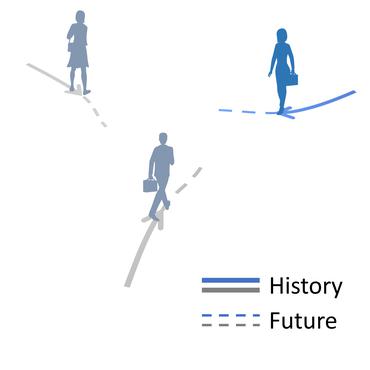Search Results for author: Arkady Zgonnikov
Found 12 papers, 3 papers with code
In the driver's mind: modeling the dynamics of human overtaking decisions in interactions with oncoming automated vehicles
no code implementations • 28 Mar 2024 • Samir H. A. Mohammad, Haneen Farah, Arkady Zgonnikov
To address these gaps, we conducted a "reverse Wizard-of-Oz" driving simulator experiment with 30 participants who repeatedly interacted with oncoming AVs and HDVs, measuring the drivers' gap acceptance decisions and response times.
Are you sure? Modelling Drivers' Confidence Judgments in Left-Turn Gap Acceptance Decisions
no code implementations • 11 Mar 2024 • Floor Bontje, Arkady Zgonnikov
We found that confidence in these decisions depends on the size of the gap to the oncoming vehicle.
Robust Multi-Modal Density Estimation
no code implementations • 19 Jan 2024 • Anna Mészáros, Julian F. Schumann, Javier Alonso-Mora, Arkady Zgonnikov, Jens Kober
We compared our approach to state-of-the-art methods for density estimation as well as ablations of ROME, showing that it not only outperforms established methods but is also more robust to a variety of distributions.
Data-driven Semi-supervised Machine Learning with Surrogate Safety Measures for Abnormal Driving Behavior Detection
no code implementations • 7 Dec 2023 • Lanxin Zhang, Yongqi Dong, Haneen Farah, Arkady Zgonnikov, Bart van Arem
Moreover, previous ML-based approaches predominantly utilize basic vehicle motion features (such as velocity and acceleration) to label and detect abnormal driving behaviors, while this study seeks to introduce Surrogate Safety Measures (SSMs) as the input features for ML models to improve the detection performance.
A cognitive process approach to modeling gap acceptance in overtaking
no code implementations • 8 Jun 2023 • Samir H. A. Mohammad, Haneen Farah, Arkady Zgonnikov
In this study, we address this issue by employing a cognitive process approach to describe the dynamic interactions by the oncoming vehicle during overtaking maneuvers.
Smooth-Trajectron++: Augmenting the Trajectron++ behaviour prediction model with smooth attention
1 code implementation • 31 May 2023 • Frederik S. B. Westerhout, Julian F. Schumann, Arkady Zgonnikov
Understanding traffic participants' behaviour is crucial for predicting their future trajectories, aiding in developing safe and reliable planning systems for autonomous vehicles.
Using Models Based on Cognitive Theory to Predict Human Behavior in Traffic: A Case Study
no code implementations • 24 May 2023 • Julian F. Schumann, Aravinda Ramakrishnan Srinivasan, Jens Kober, Gustav Markkula, Arkady Zgonnikov
The development of automated vehicles has the potential to revolutionize transportation, but they are currently unable to ensure a safe and time-efficient driving style.
Benchmark for Models Predicting Human Behavior in Gap Acceptance Scenarios
no code implementations • 10 Nov 2022 • Julian Frederik Schumann, Jens Kober, Arkady Zgonnikov
Autonomous vehicles currently suffer from a time-inefficient driving style caused by uncertainty about human behavior in traffic interactions.
Uncovering variability in human driving behavior through automatic extraction of similar traffic scenes from large naturalistic datasets
1 code implementation • 17 Jun 2022 • Olger Siebinga, Arkady Zgonnikov, David Abbink
The human responses to the selected scenes exposed the variability on both the tactical and operational levels.
MORAL: Aligning AI with Human Norms through Multi-Objective Reinforced Active Learning
1 code implementation • 30 Dec 2021 • Markus Peschl, Arkady Zgonnikov, Frans A. Oliehoek, Luciano C. Siebert
Inferring reward functions from demonstrations and pairwise preferences are auspicious approaches for aligning Reinforcement Learning (RL) agents with human intentions.
Meaningful human control: actionable properties for AI system development
no code implementations • 25 Nov 2021 • Luciano Cavalcante Siebert, Maria Luce Lupetti, Evgeni Aizenberg, Niek Beckers, Arkady Zgonnikov, Herman Veluwenkamp, David Abbink, Elisa Giaccardi, Geert-Jan Houben, Catholijn M. Jonker, Jeroen van den Hoven, Deborah Forster, Reginald L. Lagendijk
The concept of meaningful human control has been proposed to address responsibility gaps and mitigate them by establishing conditions that enable a proper attribution of responsibility for humans; however, clear requirements for researchers, designers, and engineers are yet inexistent, making the development of AI-based systems that remain under meaningful human control challenging.
Optimality and limitations of audio-visual integration for cognitive systems
no code implementations • 2 Dec 2019 • W. Paul Boyce, Tony Lindsay, Arkady Zgonnikov, Ignacio Rano, KongFatt Wong-Lin
In particular, the same optimal computational model can lead to illusory percepts, and we suggest that more studies should be needed to detect and mitigate these illusions, as artefacts in artificial cognitive systems.





